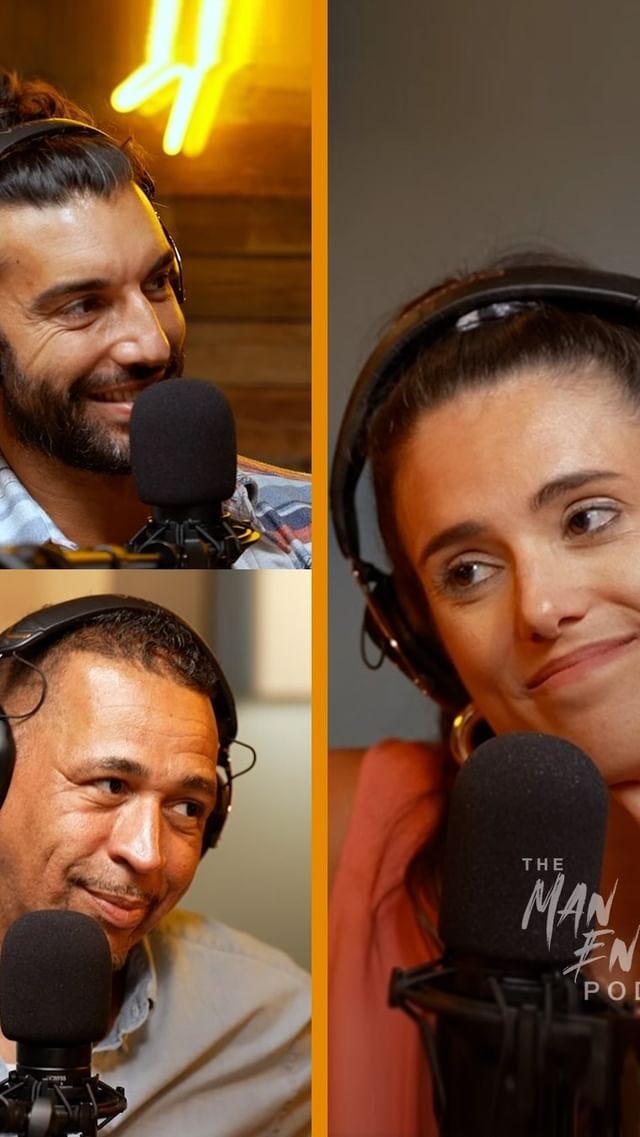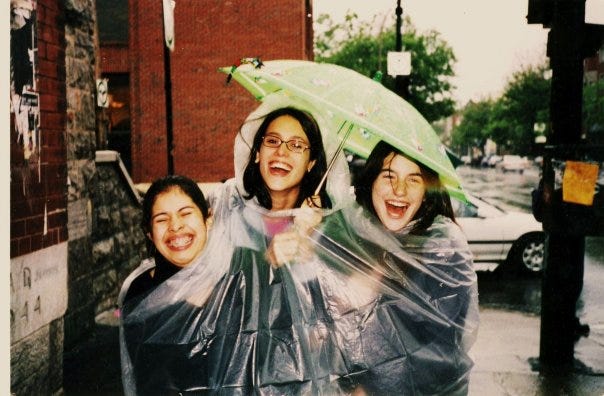“You never had to look at me. I had to look at you. I know more about you than you know about me.” -James Baldwin
If you subscribe to to this community you probably know that I’ve written a book about men and that I have a podcast about masculinity where I was recently asked by one of my co-hosts, the tremendous Jamey Heath, a question that I get almost everyday: what makes me as a woman, qualified to speak about masculinity?
My answer was off the cuff because and I didn’t think too much about it until it racked up a few million views on tiktok. It struck a nerve with other women who had also been interrogated about their audacity when they claim to understand the type of masculinity they have been directly harmed by.. When you get hurt by something, your brain automatically tries to learn it by heart to protect you. Even mice who receive electric shocks will seek to figure out the predictability of the shocks even if it doesn’t even minimize their valence.
When I saw women’s reaction online to our exchange, I instantly regretted the answer I used to give both in my book and on my press tour. I would stress that I wasn’t an expert on men because I wasn’t raised to be one. I realize now that it’s precisely because I didn’t grow up in a man’s body that I know a lot about it. Being able to predict men is not a choice for women, it’s a prerequisite for our survival. Women become experts in masculinity not out of choice, but out of necessity. We observe and learn: how men talk, what they say, what they don’t say, what it means, how they move, how they breathe, and the subtleties in their moods. We do this because our understanding of men offers the illusion of safety.
I don’t remember when I became fluent in manhood, but what I do know is that it started when I was still a girl. I started studying the men on my commute home when I was in elementary school. On the bus ride home I could feel the weight of their wandering eyes on my body. I distinctly remember feeling so befuddled that I scanned myself in the mirror before I left school to figure out what was wrong with me. While I couldn't explain what was happening, but I assumed something was wrong and that it it was my fault. “Maybe I have something between my teeth,” I thought. “Maybe I’m too tall,” I figured. I even thought that I might just simply “be in the way.” It’s no coincidence that it’s around that age when I started wishing I could be shorter, smaller or better yet— invisible.
I can’t quite remember how it all came to me, but one day while one of these menacing middle-aged men stared at me on the bus it all clicked. Oh. He isn’t staring at me, he’s staring at my body. The worst part was realizing there was nothing I could do to make him stop. By the time I was eight-years-old I had been groped on that bus. By the time I was 14, a man masturbated in front of me at a bus stop. Even the men I was taught to feel safe around, were in fact not. That same year I became estranged from a male relative when I learned that he was a sexual predator who targeted family members. Monitoring men became a subconscious hobby, something for my brain to do to tolerate the constant threat.
As I grew up I came to understand my understanding of men through Toni Morrison and James Baldwin’s theories about racism. Morrison calls the omnipresent white gaze “the little white man that sits on your shoulder and checks out everything you do or say” and that “you sort of knock him off and you’re free."
One could confuse whiteness’ steadfastness with its inherent power, but like any imposed social hierarchy its disempowering nature infects us all. “It is a terrible paradox, but those who believed that they could control and define Black people divested themselves of the power to control and define themselves,” Baldwin wrote in Essence in 1984. I believe that masculinity works the same way. It becomes a prison for both the subject and the object because freedom is impossible when it is contingent on someone else sticking to a script that wasn’t even written by them. If you can’t feel like a man unless she acts like a woman, are you really free? Whiteness and masculinity becomes best known by those who need protection from it to stay alive. Most of the knowledge is at the bottom of the social hierarchy, not the top and that whoever you hold power over, knows you better than you will ever know yourself.
I knew that people of color, especially Black women, knew white women like me, not because they wanted to, but because they had to. By reading profound writers like Dr. Brittney Cooper and Rebecca Carroll, I had learned that often the first racist attack that Black girls encounter is waged by white girls like me. I know that means that they have an informed critique and glimpse into whiteness that I am privileged enough to get to hear. At first, I resisted these truths because I was trained to put my white comfort first. It’s sad because what makes us the most defensive has the most potential to set us free. Maybe that’s why so many men question my credibility when it comes to masculinity. Are they afraid of what I might reveal?
What’s unfortunate is that the best wisdom that’s available to us rarely gets integrated because we’re all taught to pay a little less attention to the words of those who have the most to offer. Queer men have the most to teach straight men about themselves, but their voices rarely at the forefront of the men’s liberation. By the time they’re adults, most queer men could have PhDs in alpha masculinity because it’s been the biggest threat to them. One gay man I interviewed for my book told me that he was constantly subconsciously sweeping environments for men who could be a threat. “I’m scanning for other guys like me, so other gay guys, and women, and the other thing that I’m trying to look for is hypermasculinity, because those are the guys I want to avoid.” Men with disabilities also shared the most incisive insights about masculinity to me and yet often find themselves excluded from male spaces. During another interview for my book, disability rights activist and scholar Victor Pineda told me that disabled men have a unique understanding of how the pressure to be self-sufficient cuts men off from connecting with themselves and others. “It’s hard to think of themselves as asking for help or think of themselves as having to negotiate their needs or desires though another person, needing another person, those are really difficult questions for a lot of men to ask themselves,” he said. Men who don’t fit nearly into masculinity ideals are the ones who understand it best.
Women know men so well and yet are dismissed entirely.
The consequences of this macho patriarchy is that we’re all gaslit into distrusting women. And this goes double for Black women. The effects are so bad that even women end up not even trusting themselves. The majority of passengers don’t trust female pilots, with only 14% of them saying they would feel safer with a female pilot even though there’s data supporting that they are actually less at risk. Most disturbingly, it’s not just men who don’t trust female pilots, it’s women too. That’s how you know the sexist propaganda has been fully integrated, when men aren’t even required for women to gaslit themselves.
Convincing women to not even trust *themselves* serves a valuable function: it keeps the system in place. Making women explain why they should have a voice is a great way to ensure that they never have one. "The very serious function of racism is distraction,'' Morrison once said. “It keeps you from doing your work. It keeps you explaining, over and over again, your reason for being." The amount of time that marginalized people have to spend subverting oppressive structures takes away from their ability to do anything else. Imagine if we could have all that time back. Imagine all the additional contributions oppressed groups could have made had they not been busy just trying to survive. Imagine how much better the world would be if we didn’t have to be so busy becoming experts in our oppressors.







Wow, yes to all of this! It's wild to think that it is so ingrained in me to scan a room for those that will potentially harm me that I have never even considered how disturbing that act is. I'm loving Airplane Mode and the questions you have me asking myself.
There are things about us we ourselves may not know and understand but others close to us do which we may not realise. Same applies to masculinity and those that ain't men/boys